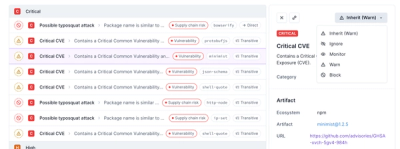
Research
Security News
Malicious npm Package Typosquats react-login-page to Deploy Keylogger
Socket researchers unpack a typosquatting package with malicious code that logs keystrokes and exfiltrates sensitive data to a remote server.
mocha-eslint
Advanced tools
Changelog
2.0.0
Readme
A simple way to run ESLint in your Mocha tests without a task runner like Grunt or Gulp.
Inspired by mocha-jshint from Allan Ebdrup.
You can install into your node.js project as a development dependency with:
$ npm install --save-dev mocha-eslint
Mocha-eslint will install ESLint for itself, so you don't need to worry about adding it to your consuming module.
The same is not true for Mocha. You should already have Mocha installed in your consuming module.
Note: verison 1.0.0 of this project uses eslint 1.0.0. Read the migration guide to learn what you need to do for the upgrade, but the main thing is that ESLint will no longer provide rules by default, you'll need to set them explicitly or extend from a shared config.
After mocha-eslint is installed, you can use it by creating a test file for Mocha and requiring mocha-eslint like so:
var lint = require('mocha-eslint');
This will return a function with the signature:
lint(paths, options)
where paths is an array of paths from your project's top level directory
(as of v0.1.2, you can also include glob patterns)
and options has a single property "formatter" which can be assigned to the
name of any of the
ESLint formatters
("stylish" (the default), "compact", "checkstyle", "jslint-xml", "junit" and
"tap") or the full path to a JavaScript file containing a custom formatter. If
options is not included, the default "stylish" formatter will be used.
So, a full test file to run in Mocha might look like:
var lint = require('mocha-eslint');
// Array of paths to lint
// Note: a seperate Mocha test will be run for each path and each file which
// matches a glob pattern
var paths = [
'bin',
'lib',
'tests/**/*Test.js',
'!tests/NotATest.js', // negation also works
];
// Specify style of output
var options = {};
options.formatter = 'compact';
// Only display warnings if a test is failing
options.alwaysWarn = false; // Defaults to true, always show warnings
// Increase the timeout of the test if linting takes to long
options.timeout = 5000; // Defaults to the global mocha timeout option
// Run the tests
lint(paths, options);
This module does not make any decisions about which ESLint rules to run. Make sure your project has a .eslintrc file if you want ESLint to do anything. As of version 1.0.0, no rules are enabled by default.
FAQs
Unknown package
The npm package mocha-eslint receives a total of 2,099 weekly downloads. As such, mocha-eslint popularity was classified as popular.
We found that mocha-eslint demonstrated a not healthy version release cadence and project activity because the last version was released a year ago. It has 1 open source maintainer collaborating on the project.
Did you know?

Socket for GitHub automatically highlights issues in each pull request and monitors the health of all your open source dependencies. Discover the contents of your packages and block harmful activity before you install or update your dependencies.

Research
Security News
Socket researchers unpack a typosquatting package with malicious code that logs keystrokes and exfiltrates sensitive data to a remote server.

Security News
The JavaScript community has launched the e18e initiative to improve ecosystem performance by cleaning up dependency trees, speeding up critical parts of the ecosystem, and documenting lighter alternatives to established tools.

Product
Socket now supports four distinct alert actions instead of the previous two, and alert triaging allows users to override the actions taken for all individual alerts.